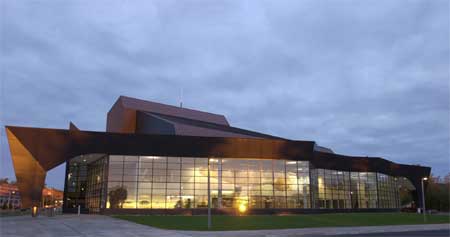Michigan Tech Under Curt Tompkins
 The
face of Michigan Tech has changed dramatically over the last 12 years,
academically and physically.
The
face of Michigan Tech has changed dramatically over the last 12 years,
academically and physically.
In 1991, US News & World Report ranked Michigan Tech as a regional university. Today, Tech is regularly among the top 50 US News & World Report public national universities.
Physically, Tech has seen the greatest upgrade in its facilities since the Ray Smith era in the late '60s and early '70s.
Facilities
 Rozsa
Center for the Performing Arts -- an 1100-seat
performance hall with full-featured stage and rehearsal space for instrumental
and vocal performing ensembles.
Rozsa
Center for the Performing Arts -- an 1100-seat
performance hall with full-featured stage and rehearsal space for instrumental
and vocal performing ensembles.
Dow
Environmental Sciences and Engineering Building -- home to civil and
environmental engineering, biological sciences, and geological sciences
and engineering. Physically linked to Dillman Hall and the Electrical
Energy Resources Center.
Hesterberg and Horner Halls -- a $10 million addition to the forestry
building, almost doubling the space for forest resources and environmental
sciences.
Harold Meese Center provides a modern attractive facility for the
Career Center and the Alumni Association.
E. Peter J. Grant Hockey Education Center -- training and office facilities
for Michigan Tech's Division I hockey program.
Community Health Center developed by Portage Health Systems adjacent
to Michigan Tech's Student Development Complex to provide convenient,
high quality health care services to students, faculty, staff and community
citizens.
Center for Integrated Learning I -- a dramatic addition and renovation
to the library and an addition to Fisher Hall to house the computer science
department. To open in 2005. Includes the John and Ruann Opie Libraryand
Kanwal and Ann Rekhi Computer Science Hall.
Advanced Technology Development Center -- A new facility to house
SmartZone companies and Michigan Tech's student enterprise program.
Wadsworth Hall Renovation -- a $35 million upgrade to this 1950s residence hall.
Academics
Between
1991 and 2004, 26 new degree programs were created at Michigan
Tech. Three new departments were established to broaden Tech's appeal,
includintg the Department of Fine Arts, the Department of Biomedical Engineering
and the Department of Education.
Established four-year degree programs in engineering technology
in the School of Technology. (Prior to 1995, all engineering technology
programs at Michigan Tech were two-year programs.)
Student Enterprise Program -- One of the major innovations in engineering education in the United States has been the design and development of the Student Enterprise Program. With $1.4 million in initial funding from the National Science Foundation and corporations, there are currently 18 enterprises involving over 500 sophomores, juniors and seniors from 12 disciplines developing engineering products. One third of the intellectual properties produced at Michigan Tech come from undergraduate students.
Initiative for the Environment -- a significant emphasis on sustainable futures in curricula and research across the campus. Helped drive the conception and construction of the Dow Building and the additions to the forestry complex. The faculty and staff who eventually occupied these buildings were very influential in the designs. The emphasis on sustainability has recently led to an Integrative Graduate Education and Research Traineeship (IGERT) National Science Foundation grant of nearly $4 million.
Other Accomplishments
Leaders for Innovation Campaign -- This capital campaign attracted $146 million and finished 18 months ahead of schedule, against an initial goal of $100 million. Michigan Tech's fundraising program has dramatically improved in the last 10 years, including providing 44 percent of the funding for the eight new facilities built during this time.
Governance -- Shared governance has taken its place at Michigan Tech.
In the early 90's the faculty senate conducted an extensive revision of
its constitution and eventually became the University Senate including
professional staff as well as faculty. Compared to governance prior to
1991, it is plain that today's approach, developed during the past 12
years, is quite different.
Distance Learning -- Major training programs for engineers at Ford
and General Motors have been successful during the past 10 years.
Community College Partnerships -- Significant four-year degree
programs have been developed in conjunction with Northwestern Michigan
College in Traverse City, Delta College in Saginaw and Henry Ford Community
College in Dearborn. Through these programs, students who are place bound
can earn Michigan Tech engineering degrees.